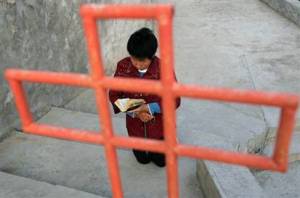
by Rick Plasterer
Christianity in China has experienced enormous growth in the last generation, but continues to suffer considerable, and at times intense, persecution. This was the message of Bob Fu, founder and President of ChinaAid, at a presentation sponsored by The Family Research Council on Wednesday, April 24. While Christianity has been is openly practiced in the communist country for some time, persecution of Christians, while widely reported among Christians in the West in recent years, continues unabated, and in fact is worsening each year, according to Fu, who cited the U.S. State Department’s annual International Religious Freedom Report in support of his claims. ChinaAid also has issued its own annual reports on religious persecution in China since 2006. Persecution can involve physical attack and severe torture, and affects not only Christians but other religions as well. Fu noted in particular 3,000 adherents of the Fulan Gong sect killed in recent years, and the self-immolation of Tibetan monks in protest of persecution in Tibet. Shortages of Bibles is another problem, with one publisher in China publishing a limited number of Bibles. Particular crises occurring at the present time noted by ChinaAid include retaliation against relatives of the exiled opponent of forced abortion, Chen Guangcheng, which Fu noted had occurred in the past day, and the arrest of seven house church leaders the previous week.
Christian growth has been remarkable during the communist period, indeed, most of China’s Christian population appears to have originated during the communist era, although there is a history of missionary activity to China in the previous several generations. Pastor Fu claimed that there were 1 million Chinese Christians at the time of the communist takeover in 1949. Today, Chinese Christians number in the millions and are members either of legal church organizations accepting state restrictions on religion, or house churches separate from state control. For Protestants, there is the Patriotic Three-Self Movement, with an estimated 20 million followers, while another 60 to 80 million Christians are part of separate house churches. For Catholics, the Chinese Catholic Patriotic Association, through which the government attempts to regulate the Church independently of the Vatican, overlaps to some extent the “underground” Catholic Church which retains a connection with Rome. The highest figure of Christians in China was estimated by a government official at 130 million, Fu said. This, however, has been denied by the government; the Pew Forum on Religion and Public Life gives a lower current figure for Christians in China of 67 million.
The Tienanmen Incident in 1989 was a turning point for the church in China, Fu claimed. After the enormous suffering of both Christians and Chinese generally during the Maoist era, with millions dying in the late 1950s and early 1960s from the radical policies of the Great Leap Forward, the failure of the Chinese government to chart a course away from communism led many intellectuals and professionals in the “Tienanmen Generation” to turn to Christianity. This massacre turned out to be “the greatest redemptive moment of Chinese history,” Fu claimed. House churches, which before had existed largely in the countryside, now appeared in cities. He noted that while he was regarded as being among “the first generation of Christians” at his university, by 1993, Beijing University had “over 500 Bible study groups.” Secret Christians are to be found even among the communist ruling class, Fu said. An important reason for Christianity’s appeal to the educated classes is their search for the “root of justice.” “Moral laws are the basis for justice,” he noted, and a moral basis for society is being found by educated Chinese especially in Christianity, Fu claimed. While expressing the belief that love will overcome persecution, he cautioned that “quiet diplomacy is not going to work when we are facing this enormous injustice.”
A problem at the present time, however, is that the current Administration “does not have a track record on the religious freedom issue, especially on public diplomacy.” This is in contrast to the administrations of Bill Clinton (who facilitated the departure of Fu three days before Hong Kong was handed over to communist China in 1997), and that of George W. Bush, who “made religious freedom his priority.” By contrast, the Obama Administration delayed a year and a half after coming to office to appoint an Ambassador at Large for International Religious Freedom, and seems not to have made religious freedom a priority in its foreign policy. This has its consequences, according to Fu. He said that he has observed that “whenever there is a voice on the U.S. side, the Chinese always listen.” Thus, “when we are quiet, the Chinese are also listening.”




Pingback by Mere Links 04.29.13 - Mere Comments on April 29, 2013 at 10:00 am
[…] Christian Growth and Persecution in China Rick Plasterer, Juicy Ecumenism […]